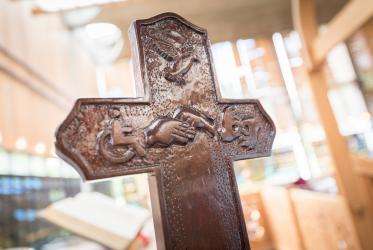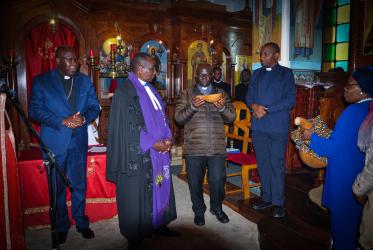Twenty church leaders from Kenya, Uganda and Tanzania met in Arusha, Tanzania from 7-11 November to discuss deepening inclusion, participation and active involvement of persons with disabilities in the spiritual, social, economic and structural life of the church and society. The forum was organized by the World Council of Churches (WCC) Ecumenical Disability Advocates Network (EDAN) and hosted by the Council of Churches in Tanzania (CCT).
Participants affirmed that, although much has been done in recent years to deepen the understanding, acceptance and integration of persons with disabilities in church and society, it is clear that more needs to be done to help churches view persons with disabilities as full participants not only in the spiritual life of the church but also in its development and power structures.
Bishop Dr Fredrick Onael Shoo, presiding bishop of the Evangelical Lutheran Church of Tanzania (ELCT), sent an opening statement to the forum that was read by Bishop Solomon Jacob Massangwa, ELCT North Arusha diocese bishop. The statement read: “The question of an inclusive society, though well-presented and spelled out by international bodies in the 2016 – 2030 Sustainable Development Goals, to most of us and particularly the traditional church, continues to be a new phenomenon. Church leaders, believers and traditionalists understood disability as a curse from a vengeful God, therefore taking on board people with disabilities is seen as an abomination.”
There is still need for sensitivity and continued dialogue to raise awareness of the separation of sin and disability, and to help churches view persons with disabilities not just as people who only receive what other people give but as full participants in the life of the church. Church leaders studied and reflected on WCC materials on disability, exploring questions related to the implications of the failure in theology to distinguish between commonalities and differences among persons with disabilities.
They also discussed how healing can be understood with respect to persons with disabilities in church and society in the 21st century, as well as how to make persons with disabilities feel valued.
While sharing their experience in disability work and disability questions, Ven. Benson Maina Thungururu of the Anglican Church of Kenya, Kirinyaga Diocese, hailed the fact that, because EDAN introduced disability discourse to theological institutions, most of the priests in his diocese went through St Paul’s University Limuru where they undertook disability studies as one of the modules. The diocese has a policy that all churches must have a ramp and at least one minister in the parish with knowledge on sign language interpretation.
Rev. Canon Nason Baluku from the Church of Uganda noted how churches in Uganda were interested in starting school for children with disabilities but did not follow up on the spiritual lives of persons with disabilities after leaving these schools.
Church leaders agreed that, even though the church has taken some steps to include persons with disabilities, the inclusion is limited to certain aspects of church life.
The church leaders also looked at the United Nations Convention on the Rights of Person with Disabilities (CRPD) and how they can use it to promote and protect the rights of persons with disabilities. To understand disability inclusion in development at a practical level, the church leaders were taken through one of the inclusive development projects that EDAN is implementing in East Africa.
Moving forward, participants agreed that, for the church to become a truly inclusive community, it should develop structures to include persons with disabilities; allow persons with disabilities to make their own decisions and nurture their talents; and promote understanding and work with persons with disabilities in society.





